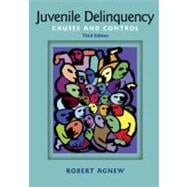
| The Nature and Extent of Delinquency | |
| What Is Delinquency and How Does It Differ From Adult Crime? | |
| How Is Delinquency Measured? | |
| How Much Delinquency Is There and Is Delinquency Increasing? | |
| Who Is Most Likely to Engage in Delinquency? | |
| The Causes of Delinquency: Theories | |
| What Is a Theory and How Do We Test Theories? | |
| Strain Theory: Does Strain or Stress Cause Delinquency? | |
| Social Learning Theory: Do Individuals Learn to Be Delinquent From Others? | |
| Control Theory: Do Weak Controls Result in Delinquency? | |
| Labeling Theory: Does the Reaction to Delinquency Lead to Further Delinquency? | |
| How Do We Explain Different Patterns of Offending Over the Life Course? | |
| Is Delinquency More Likely in Certain Types of Situations? | |
| How Can We Explain Group Differences in Delinquency, Particularly Community Differences in Rates of Delinquency? | |
| The Causes of Delinquency: Research | |
| Individual Traits: What Impact Do Individual Traits Have on Delinquency? | |
| The Family: What Impact Does the Family Have on Delinquency? | |
| The School: What Impact Does the School Have on Delinquency? | |
| Delinquent Peers and Gangs: What Impact Do Delinquent Peer Groups and Gangs Have on Delinquency? | |
| What Effects Do Religion, Work, the Mass Media, Drugs, and Guns Have on Delinquency? | |
| Pulling It All Together: Is It Possible to Construct a General Theory of Delinquency? | |
| The Control and Prevention of Delinquency | |
| How Is It Determined if a Policy or Program Is Effective in Controlling or Preventing Delinquency? | |
| The Police: What Do the Police Do to Control Delinquency? | |
| Juvenile Court and Corrections: What Do the Juvenile Court and Juvenile Correctional Agencies Do to Control Delinquency? | |
| Does the Juvenile Justice System Discriminate Against Certain Groups in Its Efforts to Control Delinquency? | |
| Is It Possible to Control Delinquency by Punishing More Offenders and Punishing Them More Severely? The Strategies of Deterrence and Incapacitation | |
| Is It Possible to Prevent Delinquency and to Rehabilitate Delinquents? The Strategies of Prevention and Rehabilitation | |
| What Should We Do to Reduce Delinquency? | |
| Table of Contents provided by Publisher. All Rights Reserved. |
The New copy of this book will include any supplemental materials advertised. Please check the title of the book to determine if it should include any access cards, study guides, lab manuals, CDs, etc.
The Used, Rental and eBook copies of this book are not guaranteed to include any supplemental materials. Typically, only the book itself is included. This is true even if the title states it includes any access cards, study guides, lab manuals, CDs, etc.